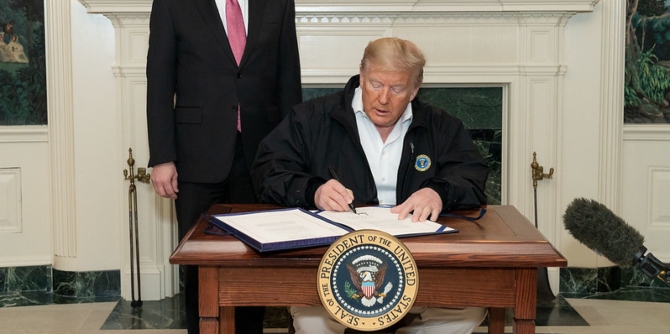
 In the past two decades, US budget deficits have skyrocketed, and the national debt is now over $22 trillion. But do Americans care about the size of deficits and the national debt? In new research, John V. Kane and Ian G. Anson find that people tend to care more about the deficits and debts when they are increased by presidents from the party that they oppose. Both Republicans and Democrats, they write, become less concerned about governments running deficits when their President is in charge.
In the past two decades, US budget deficits have skyrocketed, and the national debt is now over $22 trillion. But do Americans care about the size of deficits and the national debt? In new research, John V. Kane and Ian G. Anson find that people tend to care more about the deficits and debts when they are increased by presidents from the party that they oppose. Both Republicans and Democrats, they write, become less concerned about governments running deficits when their President is in charge.
Concerns about budgets and potential deficits often come up during elections, particularly when considering major pieces of legislation (e.g., “Medicare for All”, the “Green New Deal”, etc.). President Trump recently unveiled his proposed budget for the coming fiscal year which made headlines for its substantial cuts to social welfare programs. Despite these reductions in spending, critics also point out its lack of attention to future budget deficits and, thus, the national debt.
While proposed cuts to social spending are hardly surprising from a Republican administration, it may come as a surprise that a Republican budget proposal would not prioritize deficit reduction. The 2016 Republican Party platform, after all, repeatedly discussed budget deficits and the national debt, arguing that such reductions are necessary “in order to reaffirm our principles of responsible and limited government, and remove the burdens we are placing on future generations.”
To be sure, there is much skepticism among economists and policy experts about whether deficits and debt are actually all that harmful for the economy (see, for example, here and here). But our focus is on the disconnect between the party platform and its leader’s budget proposal. What explains this mismatch between rhetoric and policy?
Since the 1970s, a virtual constant in American politics has been that Republican and Democratic administrations preside over federal deficits and, thus a, growing national debt. Data from the St. Louis Federal Reserve shown in Figure 1 below confirms that presidents of both parties consistently add to (1) deficits, both as a share of federal spending and as a share of Gross Domestic Product (GDP) (top panel of graph below) and, (2) the national debt (as a share of GDP).
Figure 1 – Spending across administrations and public debt as a percentage of GDP

As these data suggest, easy as may be to criticize an administration for running deficits and increasing the national debt, cutting deficits and debt is hard. This is no doubt partly because the federal budget largely comprises popular programs. Citizens are reticent to make changes to Social Security and other large spending items. Proposed cuts to such programs are therefore politically dangerous, often referred to as the high-voltage ‘third rail’ of American politics.
But don’t Republicans care that President Trump’s proposal may run deficits and increase the debt?

Photo by Alice Pasqual on Unsplash
The growing literature on partisan motivated reasoning shows that partisans often reshape their beliefs in a way that accords with biased predispositions. They interpret new information through the lens of ‘wishful thinking’, seeking to minimize the cognitive dissonance that occurs when their party presides over undesirable outcomes.
In Denmark, a recent study showed that incumbents can use this phenomenon to their advantage, reassuring those that identify with their party that deficits are actually not so bad so long as their party is in control. Another study shows that when economic indicators plummet, the incumbent’s fellow party-members will blame political opponents rather than own up to their own party’s economic mismanagement. In both cases, “bias finds a way” to distort citizens’ judgments of the economic facts.
In our current research project, we examined one key implication of this growing body of research: partisan Americans are more likely to be concerned about deficits when the other party presides over them.
Here’s how we did our research
We fielded an online study of approximately 1000 US adults using a popular crowd-sourcing platform: Amazon.com’s Mechnical Turk.
We presented respondents with a (mock) report about government deficits and debt from 1973-2018. We used realistic figures in discussing the average size of the deficit ($113.50 spent for every $100 collected), as well as realistic figures concerning the amount of the budget dedicated to social welfare programs and military spending.
What we randomly varied, however, was simply whether the report discussed Democratic or Republican presidents as responsible for deficit and debt increases.
After reading the report about either Democratic or Republican presidents, respondents answered a series of questions gauging their concerns about government deficits (“In general, how concerned are you about the federal government running budget deficits?”) and prioritizing deficit reduction (“To what extent should the federal government prioritize reducing the deficit over other policies (such as funding defense and social programs)?”). We then combined these various measures into a single scale ranging from 0 to 1, where higher values indicate greater perceived importance of deficits and tackling deficit reduction.
Does the President’s Party Matter for Public Concern about Deficits?
As expected, our results show us clear evidence of partisan motivated reasoning. We find that partisans were significantly more concerned about deficits after reading a report about the other party’s presidents. In Figure 2 below, the y-axis measures experimental groups’ overall concern about deficit reduction, where higher values indicated more concern. As the left portion of the graph demonstrates, partisans expressed more concern on our 0-1 scale when reading about deficits under the out-party (a mean score of .64) compared to reading about deficits under their own party (a mean score of .58).
The right portion of the graph confirms the uniquely partisan nature of this finding: for “pure” or “non-leaning” independents (in other words, people without any overt partisan inclinations), concern about the deficit did not depend on whether they read about Democratic or Republican presidents.
Figure 2 – Concern about deficit reduction by partisanship

In a separate analysis, we also found that strongly committed partisans exhibited even stronger experimental effects, again highlighting the partisan nature of deficit concerns.
Did Republicans Behave Differently from Democrats?
Given Republicans’ well-known promotion of “fiscal conservatism”, we also explored whether Democrats and Republicans responded differently to the in-party stimulus. Did Republicans’ aversion to deficits dampen the extent of their motivated reasoning?
On average, Republicans were more concerned about deficits than their Democratic counterparts. But remarkably, as shown in Figure 3 below, the estimated effect of our manipulation was nearly identical for both sets of partisans. In other words, though the average Republican was more concerned about deficit reduction, there was no significant difference in how Democrats and Republicans behaved when confronted with their party’s history of deficit spending. Partisans of both stripes become increasingly willing to express concern about deficits when the other party is seen as responsible for them.
Figure 3 – Concern about deficit reduction by partisanship and White House occupancy

These findings help reveal why Republicans, once in the White House, run deficits even after years of intensely criticizing Democratic budgets: Republicans in the mass public won’t view it as being quite as important once a Republican becomes president.
Similarly, our findings reveal why Democrats may tend to show more concern about the national debt once it involves a Republican president. Indeed, in the 2016 Democrat Party platform, there is very little discussion of the national debt beyond an explicit warning that then-candidate Donald Trump’s plans “could add more than $30 trillion to the debt.”
While some citizens have genuine concerns about government deficits and the national debt, our research indicates that such concerns may be, at least in part, a mere talking point to attack the other party. As such, we shouldn’t be surprised by President Trump’s budget, nor some Republicans’ silence about its fiscal ramifications.
Please read our comments policy before commenting.
Note: This article gives the views of the author, and not the position of USAPP – American Politics and Policy, nor the London School of Economics.
Shortened URL for this post: http://bit.ly/2HZAw2n
About the authors
 John V. Kane – New York University
John V. Kane – New York University
John V. Kane is an assistant professor at New York University’s Center for Global Affairs. His research has been published in a variety of peer-reviewed journals and focuses on partisanship, political behavior and political psychology.
 Ian G. Anson – UMBC
Ian G. Anson – UMBC
Ian G. Anson is an assistant professor in the Department of Political Science at UMBC. Ian’s recent publications focus on partisan misperceptions, media and politics, and the scholarship of teaching and learning.






